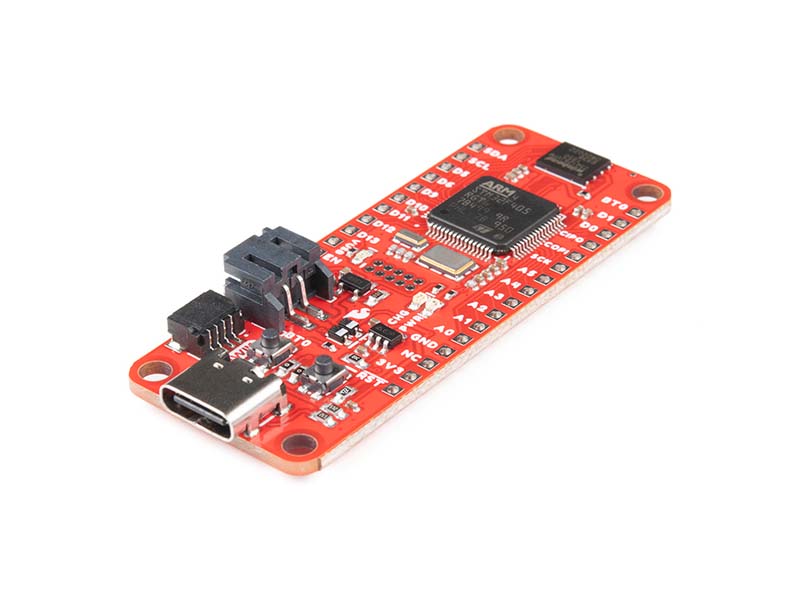
STM32 Thing Plus by SparkFun
With a 32-bit ARM® Cortex®-M4 RISC core, the SparkFun STM32 Thing Plus brings power and precision to your projects. The STM32 Thing Plus provides you with an economical and easy to use development platform if you’re needing more power with a minimal working space. This Thing comes flashed with the DFU bootloader, and to make the Thing Plus even easier to use, we’ve moved a few pins around to make the board Feather compatible. In addition, it utilizes our handy Qwiic Connect System which means no soldering or shields are required to connect it to the rest of your system!
As we previously stated; the STM32F405 Processor is based on the high-performance ARM® Cortex®-M4 32-bit RISC core and can operate at a frequency of up to 168 MHz. The Cortex-M4 core features a floating point unit (FPU) single precision which supports all ARM single precision data-processing instructions and data types. It also implements a full set of DSP instructions and a memory protection unit (MPU) which enhances application security. This Processor Board utilizes the DFU bootloader for uploading code, and incorporates an extensive range of enhanced I/Os and peripherals. In addition to the USB interface and Qwiic connection, the STM32 Thing Plus provides a 3.3V regulator and LiPo charger as well as 16MB of Flash and microSD slot for expandable memory.
Purchase
Contribute
Have some info to add for this board? Edit the source for this page here.
CircuitPython 10.1.3
This is the latest stable release of CircuitPython that will work with the STM32 Thing Plus. Use this release if you are new to CircuitPython.
Modules included in this download
_asyncio _bleio _bleio (HCI co-processor) _pixelmap adafruit_bus_device adafruit_pixelbuf aesio alarm analogio array atexit audiocore audiomixer audiomp3 audiopwmio binascii bitbangio bitmapfilter bitmaptools board builtins builtins.pow3 busdisplay busio busio.SPI busio.UART canio codeop collections digitalio displayio epaperdisplay errno fontio fourwire framebufferio getpass gifio i2cdisplaybus io jpegio json keypad keypad.KeyMatrix keypad.Keys keypad.ShiftRegisterKeys keypad_demux keypad_demux.DemuxKeyMatrix locale lvfontio math microcontroller msgpack neopixel_write onewireio os os.getenv pulseio pwmio rainbowio random re rgbmatrix rtc sdcardio sdioio select sharpdisplay storage struct supervisor synthio sys terminalio tilepalettemapper time touchio traceback ulab usb_cdc usb_hid usb_midi vectorio warnings zlibFeatures: Feather-Compatible, Battery Charging, STEMMA QT/QWIIC, Breadboard-Friendly, USB-C
CircuitPython 10.2.0-alpha.1
This is the latest development release of CircuitPython that will work with the STM32 Thing Plus.
Alpha development releases are early releases. They are unfinished, are likely to have bugs, and the features they provide may change. Beta releases may have some bugs and unfinished features, but should be suitable for many uses. A Release Candidate (rc) release is considered done and will become the next stable release, assuming no further issues are found.
Please try alpha, beta, and rc releases if you are able. Your testing is invaluable: it helps us uncover and find issues quickly.
Release Notes for 10.2.0-alpha.1
Modules included in this download
_asyncio _bleio _bleio (HCI co-processor) _pixelmap adafruit_bus_device adafruit_pixelbuf aesio alarm analogio array atexit audiocore audiomixer audiomp3 audiopwmio binascii bitbangio bitmapfilter bitmaptools board builtins builtins.pow3 busdisplay busio busio.SPI busio.UART canio codeop collections digitalio displayio epaperdisplay errno fontio fourwire framebufferio getpass gifio i2cdisplaybus io jpegio json keypad keypad.KeyMatrix keypad.Keys keypad.ShiftRegisterKeys keypad_demux keypad_demux.DemuxKeyMatrix locale lvfontio math microcontroller msgpack neopixel_write onewireio os os.getenv pulseio pwmio rainbowio random re rgbmatrix rtc sdcardio sdioio select sharpdisplay storage struct supervisor supervisor.get_setting synthio sys terminalio tilepalettemapper time touchio traceback ulab usb_cdc usb_hid usb_midi vectorio warnings zlibFeatures: Feather-Compatible, Battery Charging, STEMMA QT/QWIIC, Breadboard-Friendly, USB-C
Absolute Newest
Every time we commit new code to CircuitPython we automatically build binaries for each board and language. The binaries are stored on Amazon S3, organized by board, and then by language. These releases are even newer than the development release listed above. Try them if you want the absolute latest and are feeling daring or want to see if a problem has been fixed.
Previous Versions of CircuitPython
All previous releases of CircuitPython are available for download from Amazon S3 through the button below. For very old releases, look in the OLD/ folder for each board. Release notes for each release are available at GitHub button below.
Older releases are useful for testing if you something appears to be broken in a newer release but used to work, or if you have older code that depends on features only available in an older release. Otherwise we recommend using the latest stable release.
